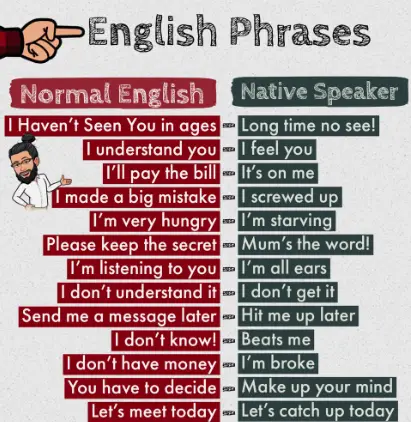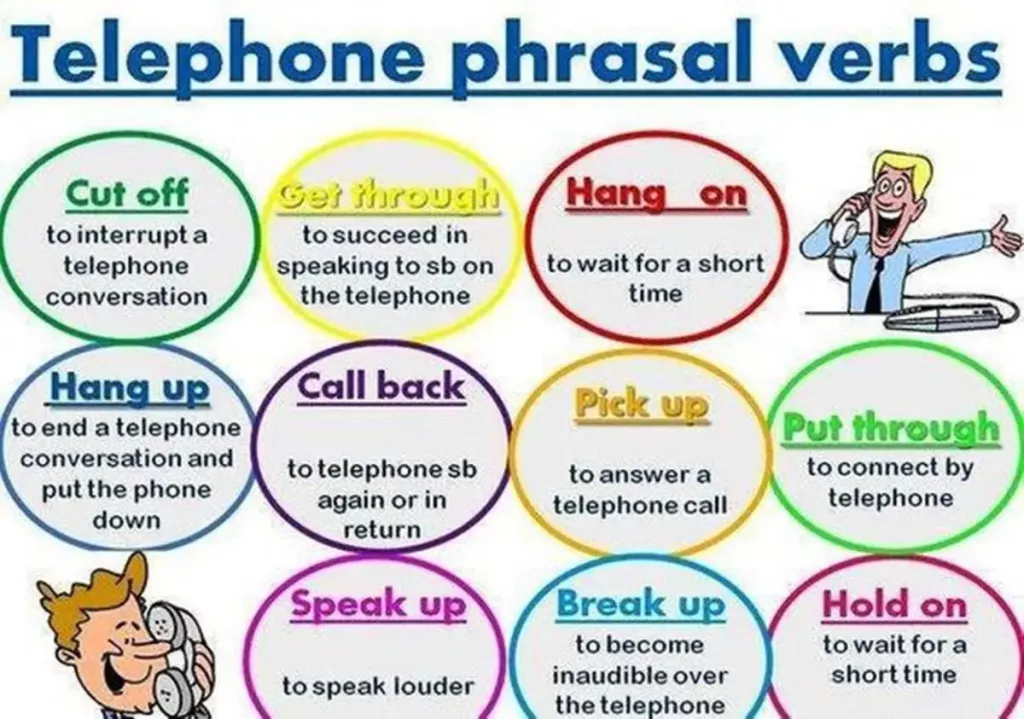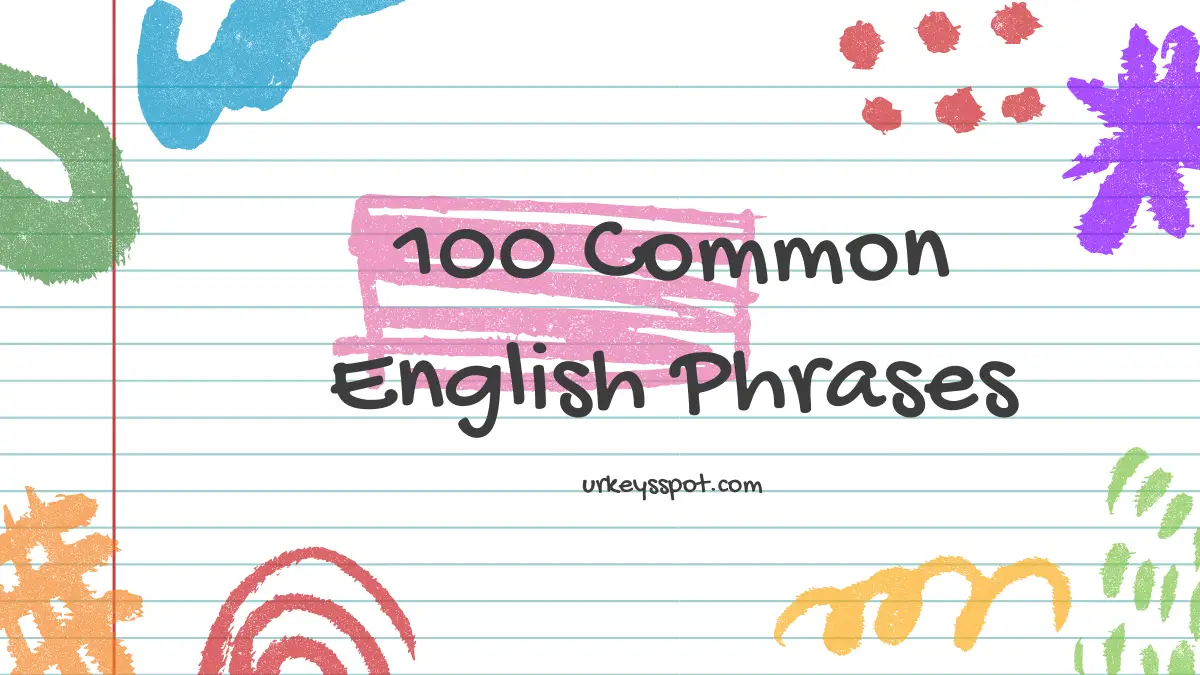In this comprehensive guide, we’ll dive into the world of Common English Phrases, uncovering the expressions that color our daily interactions and make our conversations sparkle. Whether you’re a language learner aiming to polish your English or a native speaker keen on exploring the nuances of everyday speech, this article promises a treasure trove of phrases to enhance your linguistic repertoire.
Introduction to Common English Phrases
Language is not just a tool for communication but the very fabric that connects us, allowing us to share our thoughts, feelings, and experiences. Mastering common English phrases is essential, whether you’re engaging in small talk, navigating professional landscapes, or traveling to new places.
Importance in Daily Communication

Every day, we use a myriad of phrases without a second thought, from simple greetings like “Hello” to expressions of gratitude such as “Thank you.” These phrases are the building blocks of conversation, enabling us to interact seamlessly and express ourselves with clarity and politeness.
Overview of the Article’s Structure
This article is your go-to resource, structured to guide you through various contexts where English phrases shine. From casual chit-chat to formal discussions, we’ll explore expressions that will not only boost your confidence but also enrich your conversational skills. So, let’s embark on this linguistic journey, discovering the phrases that make English vibrant and versatile.
Stay tuned as we delve into the art of small talk, professional dialogue, and much more, ensuring you’re well-equipped to handle any conversational challenge with ease and flair. Whether you’re ordering a meal, striking up a conversation with a colleague, or asking for directions, mastering these phrases will open new doors in your English-speaking adventures.
Basic Greetings and Introductions
Mastering the art of greetings and introductions in English can be a game changer, setting the tone for a warm, engaging conversation. Whether you’re meeting someone for the first time or greeting a long-time friend, these phrases are your first step in the dance of dialogue.
Common Greetings and Introductions
Ever noticed how a simple “Hello” or “Hi” can brighten someone’s day? These are your go-to starters, the bread and butter of English greetings. But don’t stop there! Spice it up with variations like “Good morning,” “Good afternoon,” or “Good evening,” depending on the time of day. And for farewells, “Goodbye,” “See you later,” or the informal “Catch you later” can add a personal touch to parting ways.
Introducing yourself or others is just as crucial. “My name is…” or “I’m…” are straightforward ways to tell someone your name. When introducing someone else, try “This is…” or “I’d like you to meet…” These phrases open the door to new connections and opportunities for interaction.
Enhancing Conversations with Politeness and Interest
Politeness goes a long way in English. Adding “Please,” “Thank you,” and “You’re welcome” to your conversational toolkit can transform your interactions, infusing them with respect and kindness.
Showing interest in others is equally important. Questions like “How are you?” or “What’s new with you?” demonstrate your genuine curiosity about the person you’re speaking with. And don’t forget to listen actively! Responses like “Really?” or “Tell me more” encourage the speaker and show that you’re engaged in the conversation.
In the realm of introductions, phrases like “Pleased to meet you” or “It’s nice to meet you” are signs of goodwill, signaling that you value the new acquaintance and look forward to learning more about them.
By mastering these basic greetings and introductions, you’re not just exchanging words; you’re weaving the fabric of connection, one phrase at a time. So next time you strike up a conversation, remember the power of these simple phrases to turn a mere exchange of words into a meaningful interaction.
For a deeper dive into greetings and introductions, explore Cambridge Dictionary’s guide to English greetings.
Everyday Conversations
Navigating the waters of everyday conversations with ease is an art form in itself. In this part, we explore the essence of small talk and casual conversation, providing you with the tools to engage, express, and connect in daily interactions.
Small Talk and Casual Conversations
Small talk is the glue that binds our social interactions, often serving as a gentle prelude to deeper conversation. Phrases like “How’s your day going?” or “What are your plans for the weekend?” can open the door to more engaging discussions. These seemingly simple questions can reveal common interests, leading to more meaningful exchanges.
But small talk isn’t just about asking questions; it’s also about sharing. Respond with more than just “Fine” or “Okay” when someone asks how you are. Try “I’m doing well, thanks! I’ve been busy with…” Sharing a bit about your own life can make the conversation more reciprocal and interesting.
Expressing Opinions and Emotions
English is rich with phrases that allow you to express your thoughts and feelings effectively. When you want to share your opinion, phrases like “I think that…” or “In my opinion…” show that you’re expressing a personal view, not stating a fact.
Emotions can be conveyed with phrases like “I’m thrilled about…” or “I’m worried that…” Such expressions provide a glimpse into your emotional world, inviting others to understand your perspective and empathize with your experiences.
Making Requests and Offers
In daily interactions, we often need to ask for help or offer assistance. Phrases like “Could you please…?” or “Would you mind…?” are polite ways to make requests. When offering help, try “Can I help you with…?” or “Let me know if you need anything.” These phrases show your willingness to assist and your consideration for the other person’s needs.
By incorporating these phrases into your daily conversations, you enrich your interactions, making them more dynamic and fulfilling. The ability to chat about the weather, inquire about someone’s weekend, or share a piece of personal news is invaluable in building rapport and deepening relationships.
Practical Situations
In the tapestry of daily life, English phrases serve as the threads that connect our interactions in various practical situations. From shopping sprees to dining experiences, the right words can make these activities smoother and more enjoyable. Let’s delve into the essential phrases that can aid you in shopping and dining scenarios.
Shopping and Transactions
Shopping – whether for necessities or pleasures – involves a ballet of words and expressions. When you’re eyeing a product, asking “How much is this?” is a good starting point. And if you’re looking for something specific, “Do you have this in another size/color?” can guide you to exactly what you need.
Negotiating prices or deals? Phrases like “Can I get a discount?” or “Is this the best price you can offer?” come in handy. After your purchase, you might hear “Here’s your change” or “Would you like a receipt?” – common phrases that round off the transaction.
Dining Out
The dining experience is flavored not just by the food but also by the conversations that accompany it. When you’re ready to order, “I’ll have the…” followed by your choice is the way to go. If you’re unsure about what to choose, “What do you recommend?” can lead to delightful culinary discoveries.
During or after your meal, you might want to express your satisfaction with phrases like “This is delicious!” or inquire further with “Can you tell me more about this dish?” And always remember, a polite “Thank you” to the staff can make their day just as much as they’ve made yours.
Enhance your dining experience by learning more phrases with BBC Learning English’s restaurant vocabulary.
Professional Interactions
Navigating the professional landscape requires a nuanced understanding of English phrases tailored for workplace communication. Whether you’re engaging with colleagues, managing tasks, or handling formal interactions, the right phrases can foster clarity, respect, and productivity. Let’s explore key expressions that enhance professional dialogues.
Workplace Communication
Effective communication in the workplace is a cornerstone of success. Starting your day with a “Good morning” or addressing your emails with “Dear [Name]” sets a professional tone. When discussing projects, phrases like “I’m working on…” or “We need to address…” help clarify your focus and intentions.
If you’re in a meeting and need to express your viewpoint, “I believe…” or “From my perspective…” are great ways to present your ideas while respecting others’ viewpoints. When you agree with a colleague, “I concur…” or “That’s a valid point…” reinforce the collaborative spirit.
Telephone Conversations

Telephone etiquette is an integral part of professional communication. When answering a call, “This is [Your Name] speaking” or “How can I assist you today?” are courteous ways to start the conversation. If you need to transfer a call or ask someone to hold, “May I put you on hold for a moment?” shows consideration for the caller’s time.
Ending calls professionally is just as important. Phrases like “Thank you for your call” or “If you have any further questions, please don’t hesitate to contact us” leave a lasting positive impression.
Discover more about professional English phrases at Khan Academy’s workplace communication section.
Travel and Directions
Traveling is not just about moving from one place to another; it’s also about navigating through new experiences and interactions. English phrases for travel and directions can be your compass, guiding you smoothly through your journeys. Let’s explore essential expressions that can aid you in seeking and giving directions, ensuring your travel adventures are as smooth as they are exciting.
Navigating New Places
When you find yourself in a new city or town, knowing how to ask for directions is crucial. “Could you tell me how to get to [place]?” is a straightforward way to seek guidance. If you’re looking for something more specific, like a restroom or a subway station, “Where is the nearest [place]?” can lead you to your destination.
If you’re on the giving end of directions, phrases like “Go straight, then turn left/right” or “It’s just around the corner” can assist those in need. Being clear and concise with your directions can be a big help to travelers and locals alike.
Common Phrases for Travelers
Travel involves various scenarios where specific phrases come in handy. At the hotel, you might need to say, “I have a reservation under [name]” or ask, “Could I have a room with a view?” When using public transportation, questions like “Does this bus/train go to [destination]?” are essential for smooth transit.
Understanding and using these travel-related English phrases not only eases your journeys but also enriches your travel experiences, allowing you to interact more confidently and immerse yourself in new environments.
Educational Contexts
In educational settings, whether you’re a student or an educator, effective communication is key to learning and teaching effectively. English phrases specific to educational contexts can greatly enhance understanding and interaction in the classroom. Let’s delve into some common expressions that can facilitate a productive and engaging learning environment.
Academic Interactions
For students, phrases like “Could you please explain that again?” or “I have a question about…” are invaluable for clarifying doubts and engaging with the material. Expressing your understanding or confusion, such as saying “I get it now” or “I’m confused about this part,” helps teachers gauge your comprehension and tailor their guidance accordingly.
Educators, on the other hand, often use phrases like “Today we’re going to learn about…” to introduce topics or “Can anyone explain what this means?” to encourage student participation and critical thinking. Providing feedback is also crucial, so phrases like “Great job on this part, but let’s work on…” can motivate and guide students in their learning journey.
Classroom Language for Students and Teachers
In the classroom, a supportive and interactive atmosphere is fostered by phrases that facilitate communication. Students might ask, “Can I work with a partner on this?” or “How will this be graded?” to understand expectations and collaborate effectively. Teachers often use phrases like “Please turn to page…” or “Remember to review…” to direct students and emphasize key points.
Understanding and using these educational English phrases enhances the learning experience, promoting clearer communication, active participation, and a supportive academic environment.
As we conclude this exploration of common English phrases across various contexts, remember that language is a tool that, when wielded with precision and care, can open doors to deeper understanding, richer experiences, and more meaningful connections in every aspect of life.
FAQs
What are English common phrases?
Common English phrases are expressions frequently used in everyday conversations. They include greetings, expressions of gratitude, simple questions, and other phrases that facilitate basic communication. Examples include “How are you?”, “Thank you”, “Please”, and “I’m sorry”. These phrases are foundational to English communication, helping speakers to navigate various social and professional situations.
How can I learn basic phrases in English?
Learning basic phrases in English involves regular practice, exposure to the language, and active usage. Start by familiarizing yourself with essential phrases used in daily interactions. You can use language learning apps, flashcards, and phrasebooks. Listening to English in songs, movies, and conversations, and practicing speaking with others, can also greatly enhance your learning.
What is a phrase for beginners?
A phrase for beginners is a simple, commonly used expression that is easy to understand and use. Examples include “Hello”, “Goodbye”, “Please”, “Thank you”, and “Sorry”. These phrases are often among the first set of expressions learned when starting to study English because they are fundamental to basic communication.
What are the 5 phrases in English?
While there are numerous essential English phrases, five key ones that are particularly useful in daily communication might include:
- “How are you?” – A basic greeting that inquires about someone’s well-being.
- “Please” – A polite expression used to make requests more courteous.
- “Thank you” – An expression of gratitude.
- “I’m sorry” – An apology or expression of regret.
- “Can you help me?” – A request for assistance.
Conclusion
Throughout this guide, we’ve traversed the vibrant landscape of common English phrases, exploring their crucial role in everyday interactions, practical situations, professional environments, travel adventures, and educational settings. These phrases are not mere strings of words; they are the keys to unlocking effective communication, fostering understanding, and building connections.
Language, with its rich tapestry of expressions, serves as a bridge between individuals, cultures, and experiences. By mastering these common phrases, you not only enhance your ability to express yourself clearly and confidently but also deepen your engagement with the world around you.
Remember, language learning is a journey—a continuous process of discovery, practice, and growth. As you incorporate these phrases into your daily conversations, you’ll find your communication becoming more nuanced, your connections more meaningful, and your world more expansive.
Whether you’re navigating the corridors of a foreign city, engaging in lively discussions at work, or delving into academic debates, the phrases we’ve explored are your companions, enhancing your interactions and opening up new horizons of understanding and collaboration.
So, armed with these expressions, step confidently into your next conversation, ready to communicate with clarity, engage with empathy, and connect with authenticity. Language is your tool, your art, and your bridge—use it wisely, and it will serve you well in every facet of your life.

